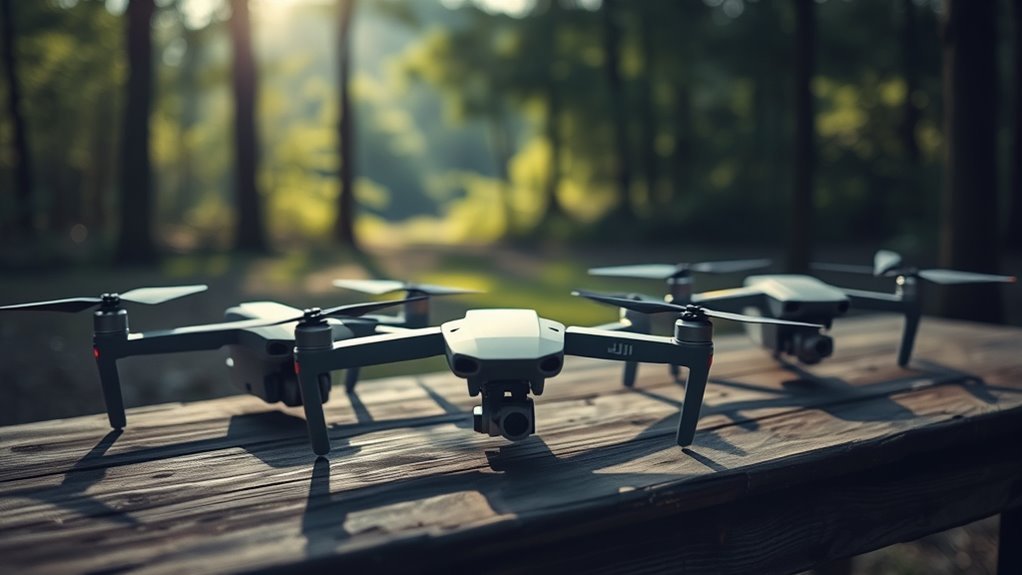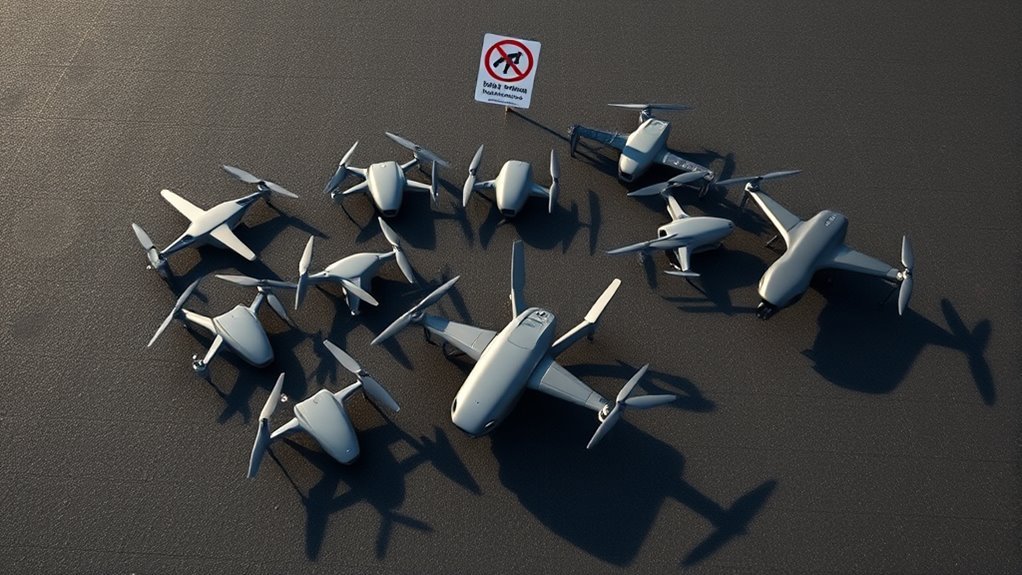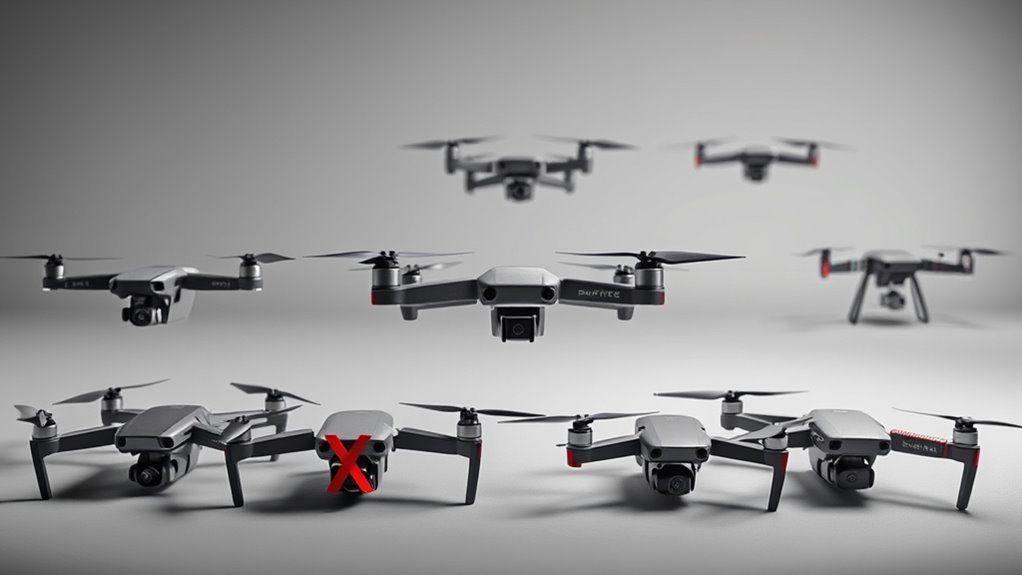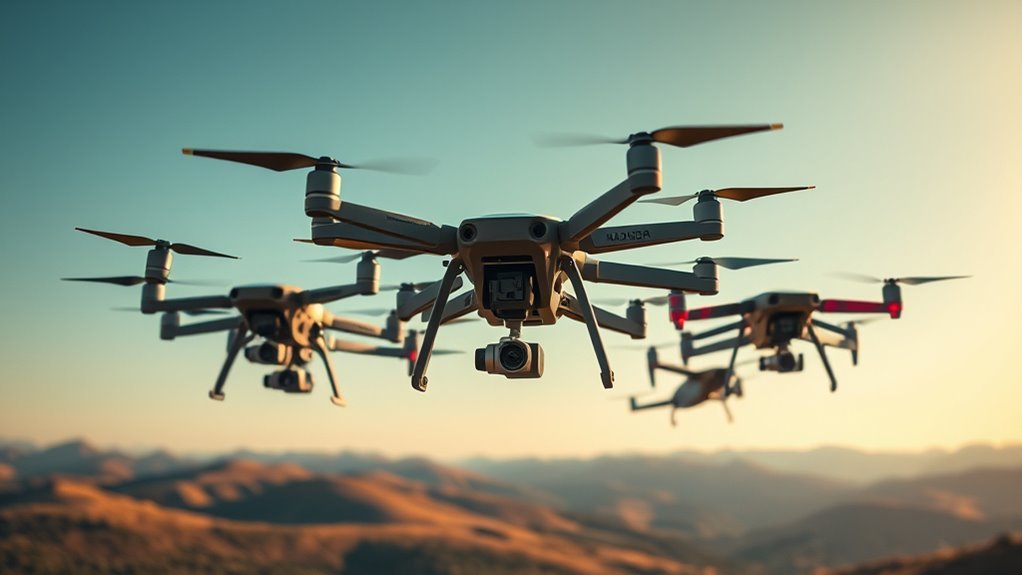Alongside DJI, other drone brands like Parrot and Autel are facing potential bans due to safety and privacy concerns. Regulators are scrutinizing these companies for their data privacy practices, which could impact their models in the market. The ongoing regulatory environment affects all drone manufacturers, making it essential for you to stay informed about restrictions. By understanding the broader implications, you can navigate these challenges more effectively and discover the evolving landscape of drone regulations.
Overview of DJI’s Regulatory Challenges

As governments worldwide tighten regulations on unmanned aerial vehicles, DJI faces significant scrutiny that complicates its operational landscape. The evolving regulatory landscape presents numerous DJI challenges, including compliance with data privacy laws, airspace restrictions, and national security concerns. You must understand that these regulations can hinder your ability to operate freely, impacting both recreational and commercial users. Additionally, the increasing calls for transparency regarding data handling practices amplify the scrutiny on DJI, forcing the company to adapt swiftly. As a result, you might notice a shift in DJI’s product offerings and features designed to adhere to these regulations. This situation underscores the delicate balance between innovation and compliance, highlighting the broader implications for the drone industry as a whole. Furthermore, the potential US ban could accelerate innovation among competing firms, pushing DJI to respond to new market dynamics. The need for robust geofencing technology has become increasingly important to ensure compliance and safety in drone operations.
Other Drone Brands Facing Bans

The regulatory challenges facing DJI are not isolated; other drone brands are also experiencing significant bans and restrictions. Manufacturers like Parrot and Autel have faced scrutiny due to concerns over drone safety, particularly regarding data privacy and security. These brands, while often viewed as alternatives to DJI, are now embroiled in brand comparisons that highlight the growing apprehension among regulators. Countries are increasingly evaluating the safety protocols and data handling practices of all drone manufacturers, not just DJI. As a result, if you’re considering options beyond DJI, it’s essential to stay informed about potential restrictions impacting your choices. The landscape is evolving, and understanding these dynamics is key to steering your freedom in drone usage effectively.
Reasons Behind Drone Restrictions

While many enthusiasts appreciate the capabilities of drones, a variety of factors have led to increased restrictions on their use. Key reasons include drone safety issues and escalating privacy concerns. Authorities worry that drones can pose risks to air traffic and public safety, leading to tighter regulations. Additionally, the potential for unauthorized surveillance raises alarms about personal privacy. Understanding federal aviation regulations is crucial for drone operators to avoid penalties and ensure responsible use. Furthermore, drone operators must consider airspace limits set by law to prevent legal repercussions.
| Factor | Description | Implications |
|---|---|---|
| Drone Safety | Risks associated with collisions and accidents | Restrictive airspace regulations |
| Privacy Concerns | Unauthorized surveillance capabilities | Increased monitoring and laws |
| Public Perception | Negative views affecting regulation | Stricter compliance requirements |
| Technological Gaps | Inability to track all drone usage effectively | Greater enforcement measures |
| International Tensions | Foreign drones raising national security issues | Heightened import/export restrictions |
Impact on Drone Owners and Operators
In light of the growing restrictions on drone usage, owners and operators are facing significant challenges that can impact their activities and business models. These restrictions not only hinder your ability to operate freely but also force you to navigate complex regulatory compliance landscapes. Ensuring drone safety has become paramount, as non-compliance can lead to severe penalties and operational shutdowns. The loss of popular models, like DJI, means you may need to invest in alternative technology, which can disrupt your workflow and increase costs. Furthermore, the uncertainty surrounding future regulations adds another layer of difficulty, compelling you to adapt quickly. Ultimately, these challenges may limit your operational flexibility and innovation potential in an increasingly competitive market. Moreover, NDAA compliance can significantly reshape the drone market, impacting both supply chains and pricing strategies. Additionally, maintaining proactive security posture is essential to safeguard against vulnerabilities that could arise with new technologies.
Future of Drone Regulations and Compliance
As drone technology continues to evolve, the future of regulations and compliance will likely become more complex and nuanced. You’ll need to stay informed as regulatory evolution reshapes the landscape. Anticipating changes in drone law is essential for maintaining operational freedom and ensuring compliance.
- Increased scrutiny on data privacy and security measures will require manufacturers to implement robust safety compliance features.
- Development of universally accepted airspace integration standards will facilitate international collaboration among drone operators and regulators.
- Enhanced collaboration between governments and drone manufacturers will lead to the creation of more adaptive regulatory frameworks.
- The integration of real-time data analytics will play a crucial role in ensuring compliance with new standards.
Navigating this evolving regulatory environment means embracing new technologies while advocating for your rights as a drone operator. Understanding the implications of these changes will empower you to adapt and flourish in a future where compliance and innovation coexist. The balance between freedom and regulation will define your experiences in this expanding aerial domain.
Frequently Asked Questions
Are There Specific Models of DJI Drones That Are Banned?
“A bird in the hand is worth two in the bush.” You’ll find DJI model restrictions vary by region due to drone safety regulations. Specific models might be banned, so check local laws before flying.
How Can I Check if My Drone Is Banned?
To check if your drone’s banned, review your drone registration details and consult local regulations. Understanding the legal implications is essential; compliance guarantees you enjoy your freedom without facing potential penalties or confiscation.
What Should I Do if My Drone Is Banned?
If your drone’s banned, assess its registration status and understand the legal implications. Consider alternative models, comply with regulations, and stay informed about restrictions to protect your freedom while pursuing aerial activities responsibly.
Are There Any Exceptions for Commercial Drone Use?
Are there exceptions for commercial drone use? Well, isn’t that a tricky question? While regulations exist, some permits may allow you to operate commercially—just be sure you’re adhering strictly to those ever-evolving drone regulations.
Will Bans Affect Drone Accessories or Parts?
Bans typically focus on specific drone models, but drone accessories and parts regulations might also be affected. You should stay informed on legislation, as restrictions could impact your ability to use or purchase certain components.

